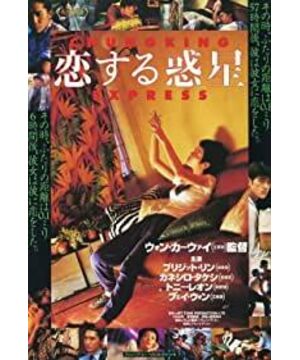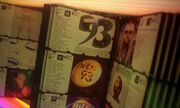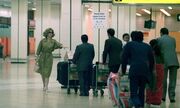From the perspective of narrative texture, when 223 and A Fei met in the fast food restaurant and looked at each other, the picture was frozen and the narrative shifted to the second half. In the swaying countdown atmosphere of the whole film, this frame freezes "time" and juxtaposes the past and the future. In this way, a fast food restaurant has become a transit station, and it does not have the function of permanent storage, but can only keep passing passengers. Similarly, the planes, supermarkets, telephone booths and other spaces reproduced in the film also convey the modern experience of the city in an almost impressionistic way - as Baudelaire said, transition, ephemeral, accidental.
Especially by accident. I always believe that the presentation of "accidental" is an important criterion for measuring the expression of urban art. In the novel "Blockade", Eileen Chang used the "tram" to describe the encounter between men and women in a trance in the city. Similarly, at the end of To Qifeng's recent work "Gold for Death", Liu Qingyun and He Yunshi, whose fates were changed by the same windfall, passed each other on the street corner. In addition to accident, there was more necessity, and this type of necessity was critical. : As a communication medium, money (currency) compresses modern time and space into a plane, and it is money that constructs the connection between people.
The "accidental" of "Chongqing Forest" is expressed in the level of love story. However, if we turn our attention to the city of "Hong Kong", then the stories of 663 and 223 have an inevitable connection, they are the two sides of Hong Kong sex.
223 was dissatisfied with the "expiration". After falling out of love, he bought a can of canned pineapples that expired on May 1 every day. The expiry date was approaching, and he was indignant at the "expiration" of the item. This anxiety about the "deadline" is easily reminiscent of 1997 - Takeshi Kaneshiro's question is: After May 1, how should I face my memories? The question raised by Hong Kong is: After 1997, how should I face the century-old colonial history?
Under the influence of Affi, 663 began to yearn for "California". California Dreaming, which Afei loves to listen to, uses music to construct the connection between the here and now and "California". However, when A Fei became a flight attendant, she told 663: California is the same. As a symbol of outsiders, this metaphor may be interpreted as "China" after 1997. It not only carries the aspirations and yearnings of the locals, but also contains self-defense-like pessimism.
In fact, 663 did not answer the question posed by 223, nor could he. Because the task of saving a broken love is not done by the subject/male, but by outsiders/females. Involuntarily, or involuntarily, it conveys the "Hong Kong sentiment" before the 1997 deadline just right. In the atmosphere of unprecedented liberation of sensibility, fetishes have become a necessity. Therefore, Takeshi Kaneshiro can only be dazed at the canned hair, and Tony Leung can only speak to the objects left by EX. Only by "materialization" can we gain a sense of security.
From a lovelorn story to a Hong Kong fable, "Chongqing Forest" can show different levels of humanities and politics from small to large, and its rich ductility has destined the film's immortality.
View more about Chungking Express reviews











